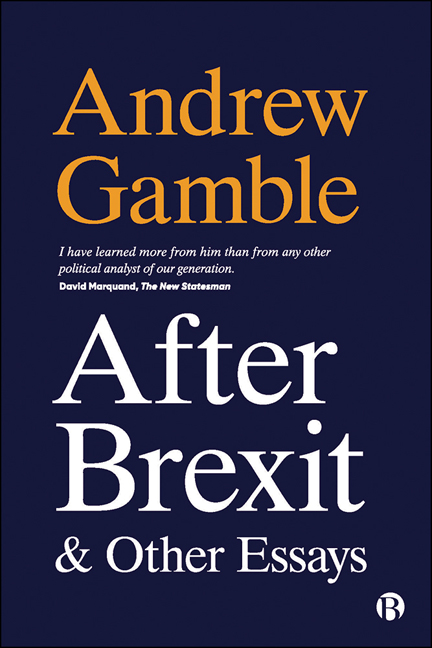Book contents
- Frontmatter
- Dedication
- Contents
- Preface
- Introduction: Historical Contexts
- Notes on the Essays
- 1 After Brexit (2019)
- 2 Explanations of British Decline (1999)
- 3 The European Disunion (2006)
- 4 The Anglo–American World View (2019)
- 5 The Free Economy and the Strong State (1979)
- 6 Thatcherism and Conservative Politics (1983)
- 7 Economic Growth and Political Dilemmas (1983)
- 8 The Crisis of Conservatism (1995)
- 9 The Thatcher Myth (2015)
- 10 Theories of British Politics (1990)
- 11 The Constitutional Revolution in the United Kingdom (2006)
- 12 What’s British about British Politics? (2016)
- Epilogue: Last Thoughts
- Notes
- Acknowledgements
- Index
11 - The Constitutional Revolution in the United Kingdom (2006)
Published online by Cambridge University Press: 22 December 2021
- Frontmatter
- Dedication
- Contents
- Preface
- Introduction: Historical Contexts
- Notes on the Essays
- 1 After Brexit (2019)
- 2 Explanations of British Decline (1999)
- 3 The European Disunion (2006)
- 4 The Anglo–American World View (2019)
- 5 The Free Economy and the Strong State (1979)
- 6 Thatcherism and Conservative Politics (1983)
- 7 Economic Growth and Political Dilemmas (1983)
- 8 The Crisis of Conservatism (1995)
- 9 The Thatcher Myth (2015)
- 10 Theories of British Politics (1990)
- 11 The Constitutional Revolution in the United Kingdom (2006)
- 12 What’s British about British Politics? (2016)
- Epilogue: Last Thoughts
- Notes
- Acknowledgements
- Index
Summary
Radical breaks and turning points are always hard to discern at the time. What looks like change can appear at a later date as continuity. How will historians come to assess the first term of the Blair Government elected in May 1997? Will they see it as marking the beginnings of a decisive change in the territorial constitution of the United Kingdom? Or simply the rearrangement of familiar furniture? Certainly in formal legal terms the territorial constitution of the United Kingdom underwent a radical change after 1997, more radical than anything that had happened since the secession of the Irish Free State in 1922. The programme of devolution which unfolded after 1997 was from the beginning the centrepiece of a much wider programme of constitutional reform on which the Government embarked. Following referendums in Scotland and Wales in the autumn of 1997, The Scotland Act 1998 and The Government of Wales Act 1998 were passed, allowing the first elections to be held for the new institutions in 1999. In 1999 also, the Good Friday Agreement on Northern Ireland's constitutional future appeared a major milestone in the peace process in that province.
Early judgements on the significance to be attached to the devolution programme differed. There were sceptics who thought that the constitutional reforms introduced by the Blair Government were largely cosmetic and left the traditional constitution intact. From this perspective the measures of devolution did not live up to the rhetoric, and far from decentralising power they were just another ruse by which Westminster continued to hold sway. Many constitutional conservatives on both right and left, however, were initially extremely alarmed by the changes, and in particular the implication of the devolution proposals for the governability and even the territorial integrity of the United Kingdom. Immediately following the reforms there was no shortage of books with titles like The Death of Britain? and The Abolition of Britain. On this side of the political argument the Blair Government was viewed as a set of constitutional vandals and tinkerers with no sense of the fragility and importance of the precious organism which had been temporarily entrusted to their charge.
- Type
- Chapter
- Information
- After Brexit and Other Essays , pp. 213 - 230Publisher: Bristol University PressPrint publication year: 2021



